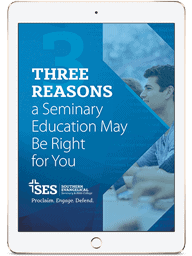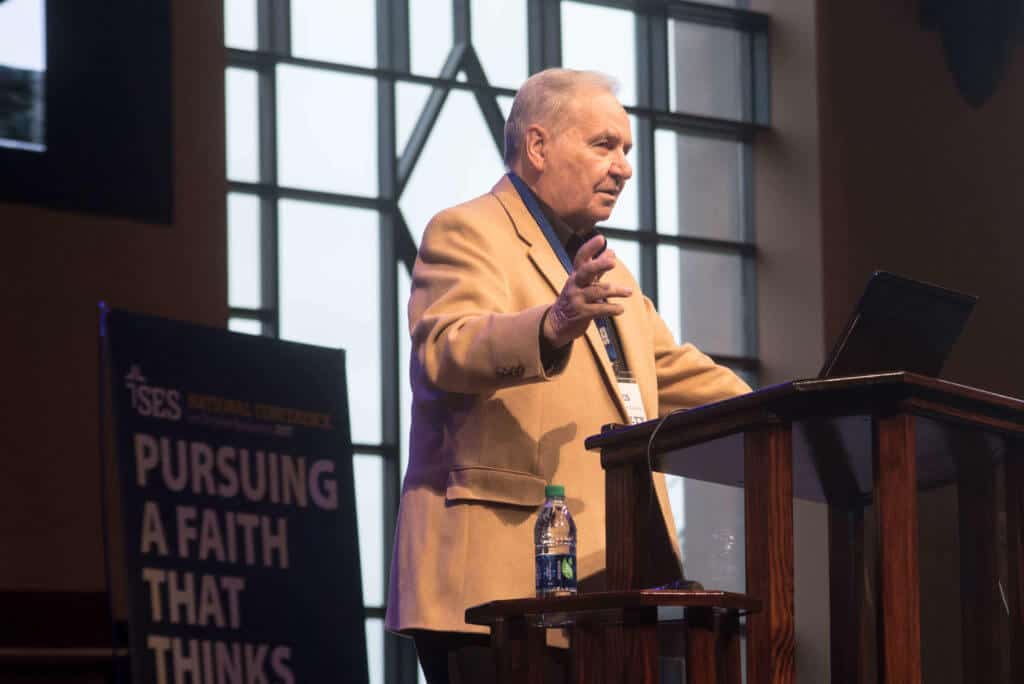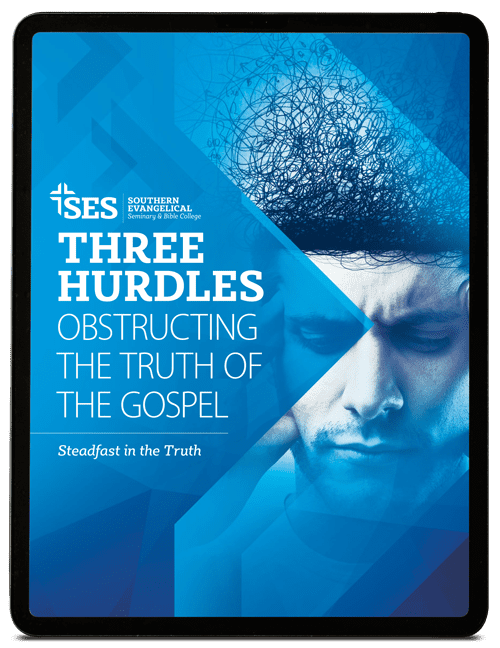“I am put here for the defense of the gospel”—The Legacy of Dr. Norman L. Geisler
The death of Dr. Norman L. Geisler is yet a reminder of what the noted Reformer Martin Luther saw when he wrote: “Let goods and kindred go, this mortal life also; The body they may kill: God’s truth abideth still, His kingdom is forever.” Dr. Geisler died today in Charlotte, NC surrounded by family and loved ones. He had recently retired from public ministry in early May due to health concerns.
For me, the story of Dr. Norman Geisler begins on the streets of Cabrini Green in Chicago, Illinois. As a nineteen-year-old struggling to serve a church in downtown Chicago I was confronted by false teachings and objections to the Christian faith. Those objections came from secularists, college students, members of the church, and close friends. I was surrounded by a culture of increasing philosophical relativism and confusion due to the wave of what became known as post-modernism in a post-Christian age. I knew Jesus Christ was my Lord and Savior and I needed to preach the gospel and defend the historic Christian faith. But where could I go to find answers?
One Friday night after failing to answer the questions and objections from a close friend, I went on a walk of lament down Chicago Avenue until I made my way to Michigan Avenue. As I walked the streets and spent several hours people watching, I kept asking myself if I could ever engage individuals in our culture with the gospel of Jesus Christ. While walking back to the church I stopped at Moody Bible Institute’s bookstore. On the shelf was Lee Strobel’s The Case for Faith, so I bought the book hoping to find answers to the various objections raised against Christianity. Strobel interviewed a collection of scholars on various objections to the Christian faith, one of whom was Dr. Norman Geisler. I read that book in one weekend and it lit a fire in my bones to defend the historic Christian faith and study under this man named Norman Geisler.
Fast forward one more year. I signed up for a theology class in college and I was required to purchase The Baker Encyclopedia of Christian Apologetics by Dr. Geisler. The professor of the class, Herb Flinkman, was a DMin student at Southern Evangelical Seminary and he required all his theology students to read Geisler’s encyclopedia. At the time, Herb was one of my heroes. One of the things that intrigued me the most, however, was the fact that he personally knew Dr. Geisler. I remember thinking to myself, “I hope I get to meet Norman Geisler someday.”
During the summer break following my sophomore year of college, I signed up to take Introduction to Apologetics as a distance student at Southern Evangelical Seminary under Dr. Geisler. One day, while studying for the course, my phone rang and I heard this voice say, “Hello, I am Norman Geisler. I was given your contact information by Herb Flinkman. He told me you would be interested in attending Southern Evangelical Seminary.” My jaw dropped and I thought it was a prank phone call. Could this really be THE Norman Geisler calling me? To my surprise, not only was Dr. Geisler on the line, but by the end of the conversation he had invited me to tour Southern Evangelical Seminary and stay at his house during my visit.
That day, I drained my bank account and bought a plane ticket for Charlotte, NC. I landed in Charlotte on a hot summer day, traveled on the Billy Graham Parkway, drove down Tilley Morris Road, and arrived at SES. I remember waiting in the library and the door flew open and a short man walked up to me and said, “I am Norman Geisler and you must be Bill Roach.” After a few moments of small talk, we quickly walked to his car (i.e., there is a reason they call him “Stormin Norman.”) and drove to his house. I remember meeting his lovely wife Barbara and several of his family members. We all went out to eat at an Asian restaurant near their home. I recall the waitress asking, “Do you want a table or a booth” and Dr. Geisler replied, “Yes.” I thought to myself, “Wow, this guy even logically analyzes the claims of hostesses!” (This example makes sense to all who learned disjunctive logic under Dr. Geisler).
During that trip God changed the trajectory of my life. I discovered that Dr. Geisler and I had a very similar background; in fact, we used to joke about it quite often. Both of us were raised in non-Christian homes, our mother’s would not allow us to play football as kids, we both had alcoholic parents, struggled significantly in school, and most importantly—after our conversion to Christ we both had to face objections to the Christian faith. Dr. Geisler used to say he got into apologetics because he was stumped by a drunk on the streets of Detroit who claimed to be a graduate of “Moody Instita Bibiltute.” Dr. Geisler knew that he either had to find answers to people’s objections or he must stop sharing his faith. Since the latter is not an option, Dr. Geisler dedicated his life to defending the historic Christian faith. I knew this was the man I wanted to study under. Therefore, I packed my bags and moved halfway across the country to Charlotte, NC.
In the years to come I came to know Dr. Geisler as more than a professor. In fact, he became my best friend and a father figure. Throughout Bible College and Seminary, Dr. Geisler and his wife would invite me to their home for holidays, meals, and special events (like the time we went to see the Carolina Panthers and Dallas Cowboys and met the players because he was the chaplain). Upon graduation from Bible College, Dr. Geisler asked me to serve as his research assistant. This role allowed me to sit at the feet and learn from one of the world’s leading apologists. Dr. Geisler taught me how to research, write, lecture, and defend the historic Christian faith. I was privileged to have an office in his home and an open door to discuss any pressing question that happened to be on my mind that day.
Dr. Geisler did more for me than just teach me how to defend the Christian faith. He also taught me to live the Christian faith. I feel like I was able to see a side of Dr. Geisler outside of the classroom very few were privileged to witness. I remember watching him love his wife Barbara and serve her daily, sing goofy Johnny Cash songs with his grandchildren, pray with those who were struggling, advise and tutor students at his home whenever they asked, financially support those in need, give up a room in his home to someone in dire straits, lend a car to someone when theirs broke down, and so much more. Dr. Geisler was much more than a scholar. He was truly a man who lived that which he believed and sacrificed for those whom he loved.
My indebtedness to Dr. Geisler is very personal. I was a young man who had serious questions about Christianity and needed a role model and a father figure in the faith. God used Dr. Geisler to provide for those great needs. He was full of knowledge and unafraid to defend the Christian faith against all opponents. He was full of love and willing to disciple me during a pivotal point in my life. In no small way my own calling as a theologian and an apologist can be traced back to Dr. Norman Geisler’s influence. I was inspired by Dr. Geisler’s intellectual engagement and deeply motivated by his vision to defend the historic Christian faith.
My indebtedness extends to the fact that Dr. Geisler seemed to be there at every significant event in my adult life. Dr. Geisler was there the day I graduated from college and seminary, he was the first one to call and congratulate me when I finished my PhD, and consoled me in the weeks following my father’s death. He officiated my wedding and offered some of the best marriage advice minutes leading up to the ceremony and was numbered among the elders who laid hands on me at my ordination. Lastly, Dr. Geisler was influential in helping me become an author, speaker, professor, and president of the International Society of Christian Apologetics. Truly, the stamp of Dr. Norman Geisler is over so much of my adult life and for that, I am eternally thankful.
As we reflect upon the life of Dr. Norman Geisler, I am reminded of Luther’s hymn A Mighty Fortress is Our God. The famous line: “Let goods and kindred go, this mortal life also; The body they may kill: God’s truth abideth still, His kingdom is forever” captures best the final chapter of Dr. Geisler’s earthly life. Dr. Geisler has now let goods and kindred go, this mortal life also, but God’s truth abideth still. In an era of church history when theology is in chaos, and the church is being shaken at its very core, and reality seems to be tossed to-and-fro with every wave of the sea, we are grateful for the example of Dr. Geisler who stood as a beacon of truth shining forth in the midst of a dark world.
Those of us who have benefitted significantly from the life and ministry of Dr. Geisler ought to remember that Christ’s kingdom is forever. It does not rest solely upon the life of any one individual. The mark of a great leader is found in their ability to live beyond the grave and pass the baton to the next generation. Dr. Geisler has now joined the great host of witnesses that have gone before us and he has passed the baton onto each of us. Therefore, it is now our responsibility to say during this time in history: I am put here for the defense of the gospel.
In closing, I once said, “I hope I get to meet Norman Geisler someday.” Not only was I able to meet him, but God used Dr. Geisler to change my life. Not only was I able to meet him, but one day because of the resurrection of Jesus Christ, Norm and I will meet again.
William C. Roach, PhD
President, International Society of Christian Apologetics.

Download Your FREE eBook!
- Reading Books and Listening to Talks is Not Enough
- Not All Apologetics Methods Are Created Equally
- A Degree is More Than a Piece of Paper










